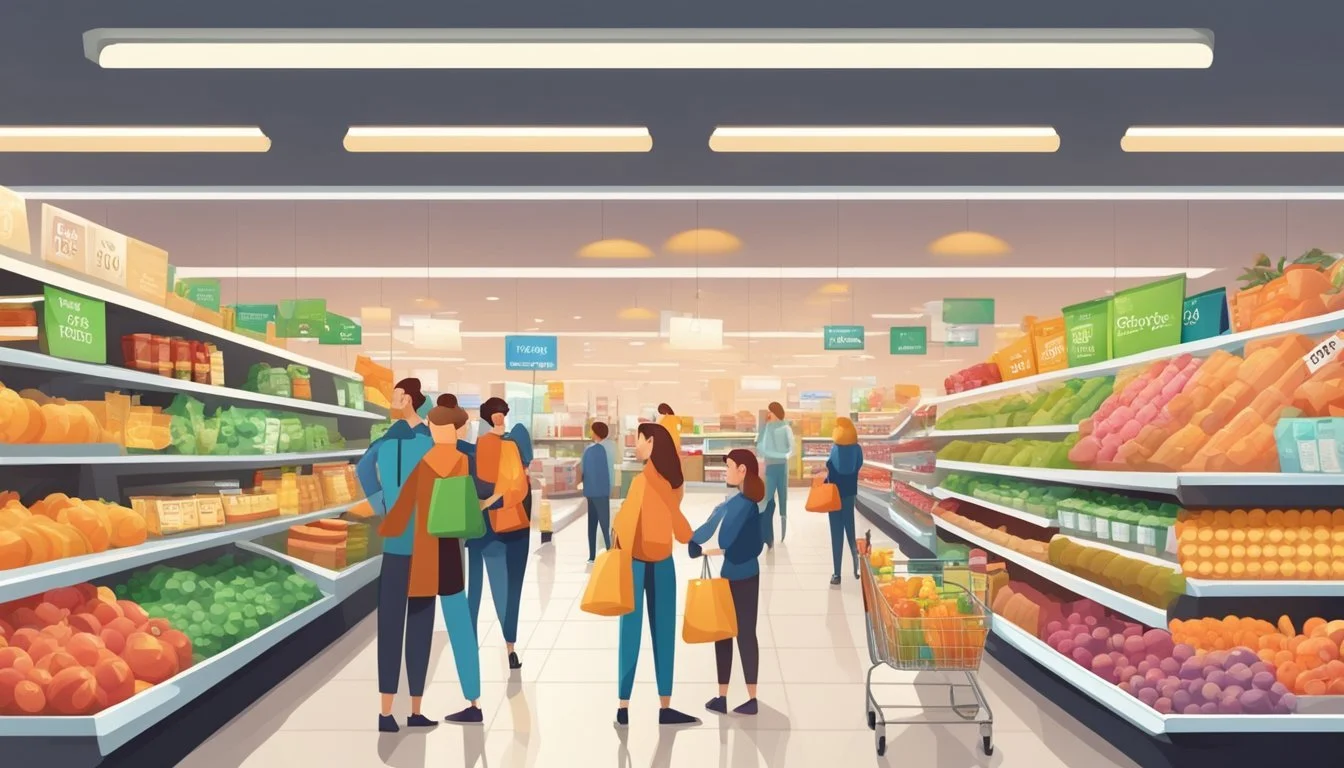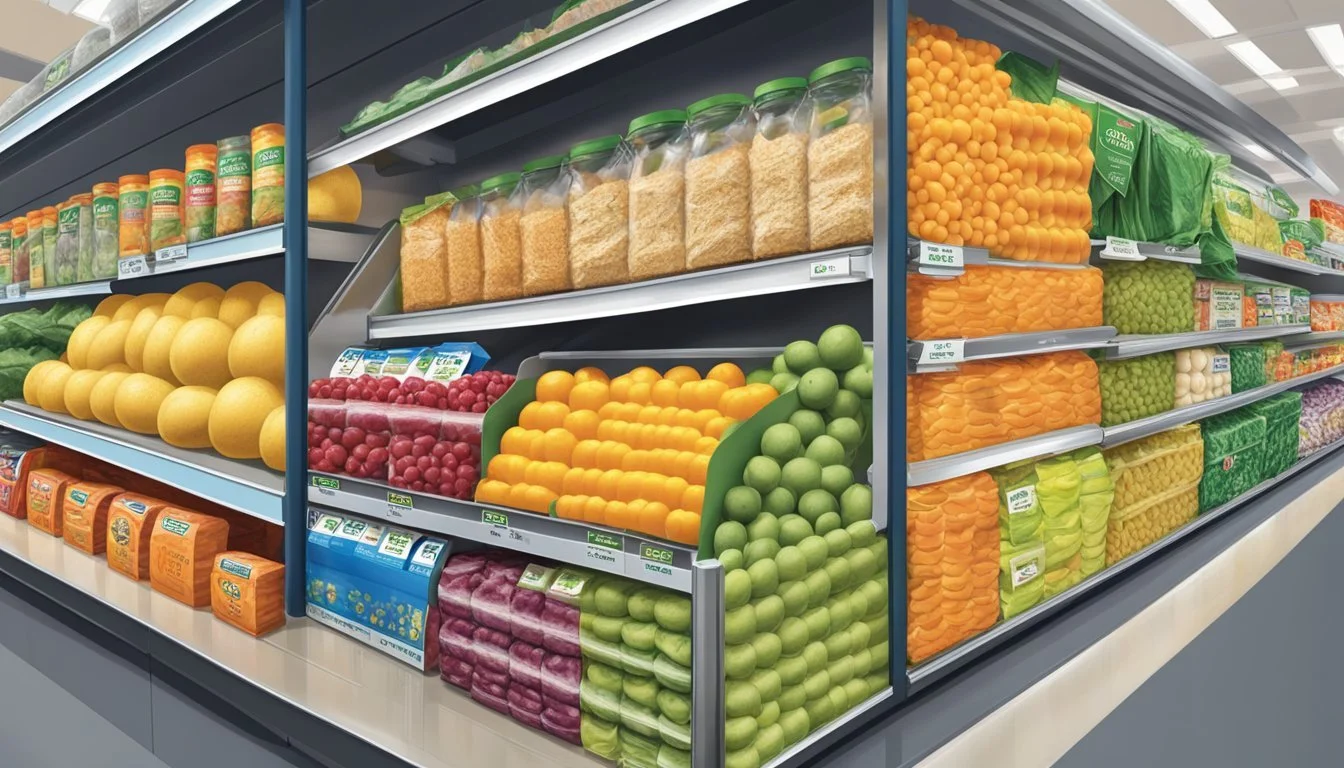Is Harris Teeter Cheaper Than Lidl?
Comparing Grocery Store Prices
Part of Our Grocery Store Guide with Details on Harris Teeter Prices and Lidl Prices
When comparing grocery prices between stores, shoppers often look to see where they can get the most for their money. Harris Teeter and Lidl are two prominent grocery chains that operate in some overlapping regions, prompting consumers to scrutinize which one offers better value. The pricing at Harris Teeter and Lidl has been a subject of interest among budget-conscious customers.
Recent comparison studies suggest that Harris Teeter's total bill can sometimes be slightly lower than Lidl's by a marginal percentage. Contrary to expectations that discount grocers like Lidl would always come out ahead in pricing, the competition appears to be closer. However, the deciding factor between the two may boil down to location convenience due to the negligible price difference.
With considerations beyond just pricing, such as product selection, store brand quality, and shopping experience, customers may find themselves weighing various factors. Harris Teeter is known to run competitive specials with their VIC program, while Lidl's Preferred Selection line boasts a wide variety of goods labeled as more affordable alternatives to name-brand products. The decision on where to shop can often reflect a balance between saving costs and personal preferences regarding the shopping environment and product offerings.
Harris Teeter Vs. Lidl Overview
When comparing Harris Teeter and Lidl, consumers are looking at two brands with distinct market positions and varied offerings. One is a conventional supermarket with a reputation for specials, and the other is a German-based discounter known for its low prices.
Market Positioning
Harris Teeter operates as a traditional supermarket chain, known for a broad selection and regular promotions through its VIC (Very Important Customer) program. It positions itself as a provider of a wide range of groceries, including premium and organic options, aiming to cater to a middle to upper-income demographic.
Lidl, on the other hand, is a German-based discounter that has gained attention for its competitive pricing strategy. It attracts cost-conscious shoppers by offering lower prices on a range of products, often under its store brand. Lidl's entrance into new markets typically disrupts the existing grocery pricing dynamics due to its aggressive cost savings.
Store Brands and Product Range
Harris Teeter boasts its own brand, offering an array of products that often match the quality of national brands. Shoppers can find a comprehensive range including pantry staples, fresh produce, and prepared foods. The brand also periodically introduces specialty items and seasonal products.
Lidl similarly provides a considerable product range under its store brands, making it roughly 20% cheaper on average for certain products, such as white sandwich bread and raw chicken. While its selection may be less extensive than traditional supermarkets like Harris Teeter, Lidl ensures the essentials are readily available and often at lower prices, appealing to budget-minded consumers.
Price Comparison Strategy
In determining whether Harris Teeter is less expensive than Lidl, one must employ a thorough and methodical approach to compare prices across a range of products.
Pricing Analysis Methodology
To ensure accuracy, the Pricing Analysis Methodology involves compiling data on a diverse set of common items sold at both Harris Teeter and Lidl. This data captures regular list prices, sale prices, and any special discounts. Analysts carefully document this information over consistent time frames to mitigate the effects of short-term promotions or price fluctuations.
General Price Trends
The General Price Trends subsection focuses on identifying patterns that may indicate a trend towards either consistently lower prices at one retailer or the other. It takes into account the retailers' pricing strategies, such as Lidl's focus on low prices daily and Harris Teeter's emphasis on quality and promotional discounts. The analysis takes into account the average savings a shopper might expect based on typical spending habits.
Item-Specific Price Evaluation
Within Item-Specific Price Evaluation, analysts conduct an item-by-item comparison of price tags. They examine a basket of goods that includes a variety of categories such as produce, dairy, meats, and pantry staples. They note the price of each item at both Harris Teeter and Lidl, identifying which retailer offers the lower price for each specific product. This detailed comparison provides insight into which store may save consumers money on particular items and contributes to the overall assessment of value.
Quality and Variety of Products
When comparing Harris Teeter and Lidl, the focus often shifts to the quality and variety of their offerings, particularly in fresh produce, meats, and organic options.
Fresh Produce Quality
Harris Teeter prides itself on offering a wide selection of fresh fruits and vegetables. Customers frequently find that the freshness and quality of Harris Teeter's produce section are commendable, with a consistent stock of both common and exotic items. Lidl, on the other hand, offers a smaller, yet curated selection of produce that is competitively priced and often features discounts on fruits and vegetables.
Harris Teeter: Known for better variety
Lidl: Competitive prices, smaller range
Meat Quality
In the meats department, both retailers provide an assortment of cuts and types of meats, with Harris Teeter generally offering a broader spectrum of premium options including USDA Choice meats. Lidl's strengths lie in its store brand meat products, which provide value for cost-conscious consumers without compromising on taste.
Harris Teeter: Wider selection including premium cuts
Lidl: Store brand meats offer good value
Organic and Healthy Options
Harris Teeter has a reputation for its extensive catalogue of organic and healthy products, catering to a broad demographic interested in dietary and lifestyle choices. Their organic section includes dairy items, meats, and vegetables. Lidl also places emphasis on healthy living, frequently promoting their organic range which, while not as extensive as Harris Teeter's, includes high-quality selections at lower price points.
Harris Teeter: Large selection of organic and health-focused products
Lidl: Quality organic options at more accessible prices
Consumer Shopping Experience
When choosing between Harris Teeter and Lidl, customers often consider factors like service, store layout, and checkout efficiency, elements that are integral to a satisfactory shopping experience. Each store has a distinctive approach to interacting with customers and managing store operations.
Service and Staff
At Harris Teeter, customers generally find that staff are helpful and pleasant. This chain prides itself on customer service, and many shoppers have noted that employees are willing to go the extra mile to assist them. Lidl, on the other hand, operates with a more streamlined staffing approach, which can sometimes result in less immediate assistance on the shop floor. However, the service at both stores meets the expectations of most customers, with each one offering a different kind of efficiency.
Store Layout and Design
The store layout and design at Harris Teeter favor a traditional supermarket setup with well-organized aisles and promotional displays. On the contrary, Lidl's layout takes a more minimalist and standardized approach, reflecting its roots as a discount grocer. It focuses on functionality and may not have the same level of in-store branding or detailed categorization of products. Customers may notice that while Harris Teeter provides a more familiar shopping experience, Lidl’s layout facilitates a faster shopping trip with less time spent navigating the store.
Checkout Efficiency
Harris Teeter offers several checkout options, including self-checkout lanes for customers who prefer to handle the process themselves, which can save time during off-peak hours. Lidl also provides efficient checkout experiences, but with fewer staffed lanes, customers might experience longer wait times during peak hours. Nonetheless, both stores have invested in technology to keep checkout times as quick as possible, recognizing its importance in overall customer satisfaction.
While both retailers offer their own store brands, Harris Teeter's store brand products are known for their quality, being comparable to or sometimes exceeding national brand standards. This focus on quality enhances the overall shopping experience for Harris Teeter's customers. Lidl's own brands are also recognized for their value, offering competitive quality at a lower price point, which can significantly influence a customer's overall satisfaction with their shopping trip.
Savings and Discounts
When comparing Harris Teeter and Lidl, savings and discounts are significant factors consumers consider. Both grocery chains offer various programs and deals designed to provide customers with opportunities to save on their shopping bills.
Loyalty Programs
Harris Teeter offers a VIC card (Very Important Customer), which provides shoppers with personalized discounts, digital coupons, and special offers. By signing up for a VIC account, customers can avail themselves of e-VIC benefits, which include additional discounts that vary each week.
Lidl, on the other hand, does not offer a loyalty card, but customers can download the Lidl Plus app. The app frequently offers digital coupons and exclusive rewards to its users. Shoppers can get instant price reductions on select products by using the app at checkout.
Weekly Specials and Discounts
Harris Teeter is known for featuring weekly specials where customers can find discounted prices on a range of products. Sales flyers and online newsletters often list these deals, which incentivize customers to plan their shopping around sale items.
Lidl's pricing strategy includes offering low-cost items without the need for a loyalty program. They boast low prices on a daily basis but also highlight limited-time, deep-discount specials weekly. These discounts are usually on both groceries and non-food items, allowing customers to save on a wide variety of products.
Accessibility and Convenience
When considering whether Harris Teeter or Lidl is more accessible and convenient for consumers, factors such as store locations and online shopping options become crucial. The ease of reaching a physical store for in-person shopping and the availability and efficiency of online services, including delivery and curbside pickup, play significant roles in a customer's overall grocery shopping experience.
Store Locations
Harris Teeter and Lidl operate numerous stores across different locations, making accessibility a point of comparison.
Harris Teeter typically situates its stores in the southeastern and mid-Atlantic regions of the United States. Customers can expect a wider range of store brands, including Harris Teeter Organics, at their locations. Their stores are intended to be located within a reasonable distance for convenient in-person shopping.
Lidl, on the other hand, has been expanding its presence in the United States since its debut, with a concentration on the East Coast. This German-based retailer is known for its discount prices and store-brand items which contribute to its value proposition.
Both chains offer location finders on their websites, allowing customers to find the nearest store with ease.
Online Shopping Options
E-commerce has become an integral part of grocery shopping, with both Harris Teeter and Lidl offering online services.
Harris Teeter provides its customers with various online shopping amenities including:
Delivery: Partnering with services such as Instacart, delivery options are made convenient for customers preferring to shop remotely.
Curbside Pickup: Harris Teeter's ExpressLane service offers a seamless option for customers to shop online and have groceries loaded into their vehicle upon arrival.
Lidl offers a more limited set of online shopping options, primarily focusing on in-store experiences and weekly deals to keep costs low. Nevertheless, they have started to explore online services to meet the growing demand for home delivery and curbside services in selected locations.
Competitive Analysis
When analyzing the pricing competitiveness of Harris Teeter in comparison to Lidl, it's crucial to consider how Harris Teeter's prices stack up against other grocery chains as well as niche market competitors.
Comparison with Other Grocery Chains
Harris Teeter competes with Walmart, Wegmans, Target, and Kroger among the larger supermarket chains. In terms of pricing, Walmart consistently offers the lowest costs, often seen as the benchmark for overall value. Prices for groceries at Wegmans remain competitive, commonly aligning with those found at Harris Teeter, and roughly seven percent lower than Safeway. Target offers a varied selection but may not be competitive in terms of a dedicated grocery shopping trip. Comparatively, Harris Teeter's prices are often similar to Kroger, as both provide a range of discounts and loyalty programs to their customers.
It is worth noting that both Whole Foods and Sprouts Farmers Market typically command higher prices due to their focus on organic and natural products. Similarly, Trader Joe's has a unique product selection, which may not directly compare in a standard pricing analysis, yet their prices are competitive within their market segment.
Niche Market Competitors
Exploring the niche competitors, Aldi and Lidl are known for their cost-effective pricing structure, focusing on efficiency and private-label brands. While Lidl was found to be only slightly more expensive than Harris Teeter in a close study, Harris Teeter offers a larger selection of goods which may appeal to a broader shopper demographic. Food Lion often emerges as a price standout with potential savings for families, yet Harris Teeter often counters with special deals through their VIC program.
When considering warehouse clubs like Costco, Sam's Club, and BJ's, shoppers may find lower unit prices thanks to bulk purchases, but the comparison is not straightforward due to membership fees and the larger quantities sold. Amazon, with its online presence and acquisition of Whole Foods, also plays a role in the competitive landscape, providing convenience through delivery but at a premium.
Lastly, local grocery stores and regional chains such as Weis Markets, Publix, and Market Basket cater to their local communities and often partake in intense regional pricing wars. However, Harris Teeter's positioning in the market as a subsidiary of Kroger allows it to leverage economies of scale and remain a strong competitor within this diverse landscape.
Customer Perception and Brand Loyalty
Customer perceptions and brand loyalty are critical for grocery stores as these factors often influence shopping habits. Researchers and surveys have shown that these components are shaped by a variety of experiences and perceptions.
Customer Ratings and Reviews
When considering customer ratings, Harris Teeter tends to be viewed favorably for its cleanliness, customer service, and product variety, which could be observed through various online reviews and survey data. Lidl, on the other hand, receives positive ratings primarily for its affordability and special deals, as reflected in consumer feedback and ratings. It is important for shoppers to note that these ratings might differ by location and could align with personal shopping priorities.
Brand Loyalty Factors
Brand loyalty for grocery stores like Harris Teeter and Lidl is influenced by multiple factors. For Harris Teeter, customer loyalty often stems from its perceived higher quality product offerings and additional in-store amenities, which are suggested by analysts to resonate with a segment of customers despite higher price points. Meanwhile, Lidl's loyalty is generally attributed to its competitive pricing and private label products that promise value for money, an aspect that consistently scores high among cost-conscious consumers.
Factors Influencing Harris Teeter Loyalty:
Quality of fresh produce and meats
Store cleanliness and shopping experience
Loyalty programs and customer service
Factors Influencing Lidl Loyalty:
Lower-price and discount product range
Savings on private-label brands
Special deals and weekly offers
These loyalty drivers reflect customer preferences and could impact the choice of store, notwithstanding the narrow price difference.
Industry Trends and Economic Factors
In analyzing whether Harris Teeter is cheaper than Lidl, it is critical to consider the ever-evolving industry trends and local economic factors that influence pricing.
Influence of Industry Trends
Industry trends have a significant effect on the pricing strategies of grocery chains. Supermarket chains like Harris Teeter and Lidl operate in a highly competitive environment where national-brand products and private labels vie for consumers' favor. As trends lean towards cost-effectiveness and value, stores must adapt by offering competitive pricing. A case in point is the shift towards discount models, which has allowed chains like Lidl to offer lower prices and pressures conventional chains to reassess their pricing.
Impact of Local Economic Factors
Local economic factors are pivotal in setting the prices at grocery stores. D.C.-area stores and those in other regions, such as Rochester, must adapt to the local all-store average to remain competitive. If regional economic factors like real estate costs, local wages, and taxes are high, even discount chains might exhibit a higher than expected price level. Consequently, a store's ability to offer lower prices is partly dictated by these microeconomic elements, potentially affecting the overall quality and price perception among consumers.
Conclusion
When comparing the pricing between Harris Teeter and Lidl, the data suggests a narrow margin. Harris Teeter's total comes to $102.10, marginally lower than Lidl's, which is at $103.26. This difference is roughly 1%, indicating a competitive pricing landscape between the two grocery chains.
Shoppers may also consider other factors like convenience, store proximity, discount availability, and personal preferences for specific products. For instance, if a customer is a student, they might lean towards a store like Giant, known to offer a 5% student discount in certain locations.
In terms of overall grocery spending, Walmart and Food Lion stand out for significant yearly savings, with Walmart's prices being 16% lower than the average of all surveyed stores.
Each grocery store carries exclusive products that may influence a shopper's decision. For example, Lidl is recognized for certain items such as chocolate and green mangos, while Harris Teeter is noted for its $10 pot roast dinners.
In light of these findings, customers are encouraged to consider their unique shopping needs alongside the evident price competitiveness. The choice between Harris Teeter and Lidl may ultimately come down to individual preferences and shopping habits.
It is clear that both Harris Teeter and Lidl offer competitive prices, and the decision between the two could hinge on factors beyond the checkout total.









